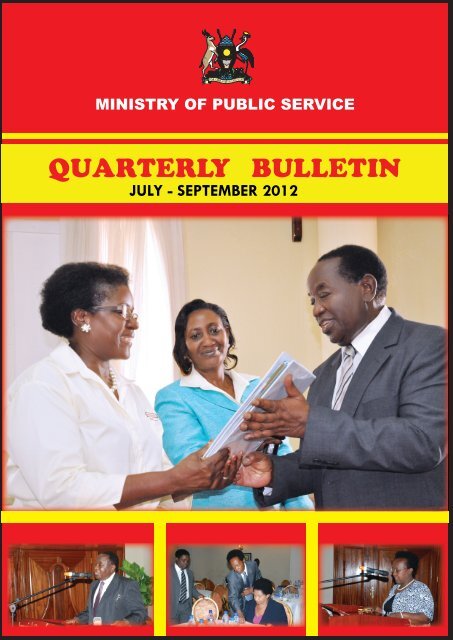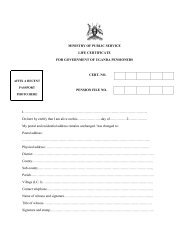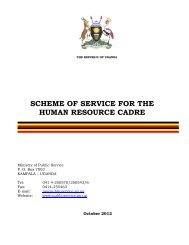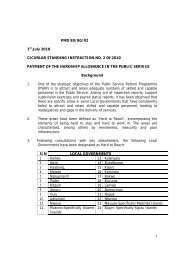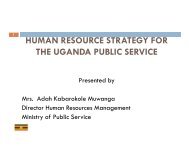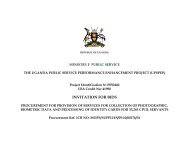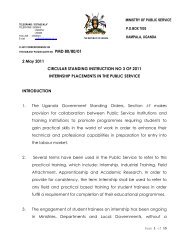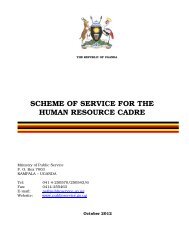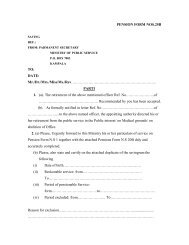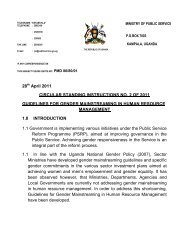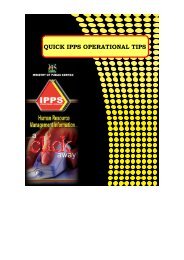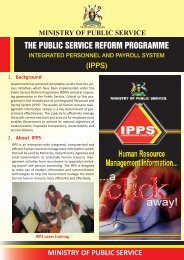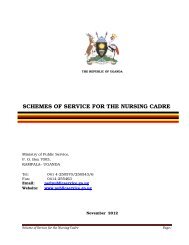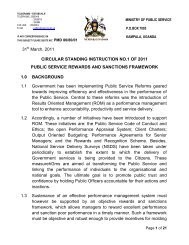Ministry of Public Service Quarterly Bulletin July-September 2012
Ministry of Public Service Quarterly Bulletin July-September 2012
Ministry of Public Service Quarterly Bulletin July-September 2012
- No tags were found...
Create successful ePaper yourself
Turn your PDF publications into a flip-book with our unique Google optimized e-Paper software.
MINISTRY OF PUBLIC SERVICEQUARTERLY BULLETINJULY - SEPTEMBER <strong>2012</strong>
Table <strong>of</strong> ContentsPage12The <strong>Public</strong> <strong>Service</strong> Pension ReformsGovernment <strong>of</strong> Uganda Receives Free Balance <strong>Public</strong> FinancialManagement Award <strong>of</strong> Excellence for Data & Process Migration.3<strong>Ministry</strong> <strong>of</strong> <strong>Public</strong> <strong>Service</strong> holds the 5th and Last Annual Review<strong>of</strong> the 3rd Phase <strong>of</strong> the <strong>Public</strong> <strong>Service</strong> Reform Programme (PSRP)7A Joined Up Approach To Inspection In The <strong>Public</strong> <strong>Service</strong>8Implementation <strong>of</strong> the Results Oriented Management (ROM) & OutputOriented Budgeting (OOB) Framework in the <strong>Public</strong> <strong>Service</strong>10The Civil <strong>Service</strong> College Uganda
TheEditorialWelcome to the <strong>July</strong> – <strong>September</strong> <strong>2012</strong> edition<strong>of</strong> the <strong>Ministry</strong> <strong>of</strong> <strong>Public</strong> <strong>Service</strong> <strong>Quarterly</strong>bulletin, a magazine that highlights some <strong>of</strong> theprogress achieved by the <strong>Ministry</strong> through itsvarious departments and partnerships. In thisedition, we look closely at the ongoing pensionreforms, the last annual review <strong>of</strong> the <strong>Public</strong><strong>Service</strong> Reform Programme (PSRP), the Civil<strong>Service</strong> College Uganda, and implementation<strong>of</strong> the ROM/OOB framework in the <strong>Public</strong><strong>Service</strong>, among others.The article on the <strong>Public</strong> <strong>Service</strong> pensionreforms brings to bear the facts surroundingthe affordability <strong>of</strong> the current <strong>Public</strong> <strong>Service</strong>Pension Scheme and it highlights the proposalsunder the newly enacted Uganda RetirementBenefits Regulatory Authority Act 2011, whichintroduces the concept <strong>of</strong> contribution bythe serving <strong>of</strong>ficers. This is meant to addressthe chronic issue <strong>of</strong> pension liabilities andunderfunding.In the summary <strong>of</strong> review <strong>of</strong> the recentlyconcluded <strong>Public</strong> <strong>Service</strong> Reform Programme,mention is made <strong>of</strong> the need to maintainmomentum in implementation <strong>of</strong> the reformsprescribed under the 3rd phase <strong>of</strong> the PSRP andthe entire Reform Programme indeed. The needto develop networks between implementingagencies, the need to serve with pr<strong>of</strong>essionalismand integrity, and above all the ability to rendercorrupt-free service, are among the manystrategies and values prescribed by speakers <strong>of</strong>the day.funding challenge. We note the improved avenuesfor addressing individual complaints, and theimproved access to direct technical support,among others. We also take a look at how theROM/OOB framework has matured and how itis shaping the platform for planning, budgeting,monitoring, and evaluation <strong>of</strong> both individualand institutional programmes and activities.In the concluding article, we highlight the Civil<strong>Service</strong> College and its premier activities whichkicked <strong>of</strong>f with the induction <strong>of</strong> newly recruited<strong>Public</strong> Officers at the National Leadership InstituteKyankwanzi. The College has since progressedto <strong>of</strong>fer other tailor-made programmes like theLeadership and Change Management Programmefor top leadership, <strong>of</strong>fered in partnership with theOntario <strong>Public</strong> <strong>Service</strong>.It is my hope that this edition makes interestingreading and it spurs the contribution <strong>of</strong> articlesfor subsequent editions <strong>of</strong> this magazine. It isonly when we document our successes that ourstakeholders will become aware <strong>of</strong> them.Joseph KiggunduIn this quarter, we dip into the activities <strong>of</strong> thejoined-up inspection programme and recognizeits many successes amidst the continued
THE PUBLIC SERVICE PENSION REFORMSPension is a constitutionalright and is regulatedby the Pensions Act Cap 286 andother laws.Pension is paid to public <strong>of</strong>ficerswho serve and retire in the Centraland Local Governments as wellas in the military. The <strong>Public</strong><strong>Service</strong> Pension Scheme is anon-contributory, pay-as-you-go,unfunded and defined benefitsScheme. It has been in existencefor over sixty years. At the inception<strong>of</strong> the Scheme in 1946, the size<strong>of</strong> the <strong>Public</strong> <strong>Service</strong> was smalland the salaries <strong>of</strong> <strong>Public</strong> Officerswere competitive. Over the yearshowever, the size <strong>of</strong> the <strong>Public</strong><strong>Service</strong> grew and salaries becameless competitive. This created achallenge <strong>of</strong> adequacy <strong>of</strong> pensionbenefits. Government respondedto the challenge by introducing anumber <strong>of</strong> parametric reforms onthe Scheme. Ironically however,the attempts to address theproblem <strong>of</strong> inadequacy <strong>of</strong> thebenefits created a problem <strong>of</strong>affordability and sustainability <strong>of</strong>the Scheme.In the case <strong>of</strong> Local Governments(LG), pension benefits werepaid to the retired staff from thelocal revenues. The majority <strong>of</strong>the Local Governments failedto meet this responsibility andthe pension liabilities became sounmanageable that the CentralGovernment, through <strong>Ministry</strong> <strong>of</strong><strong>Public</strong> <strong>Service</strong>, (MoPS) took overthe payment <strong>of</strong> the LG pensioncommitments. To address thischallenge the Government, overthe years, increased the pensionbudget.Furthermore, Governmentconceived a study <strong>of</strong> the Schemeto inform the pension reformsand address the chronic problem<strong>of</strong> increasing pension liabilitiesand underfunding. The studyconfirmed that the Scheme wasArticle by: Mr. Stephen Kiwanuka Kunsa, Director R&D MoPSunaffordable and unsustainable,and proposed recommendationsto address the challenges <strong>of</strong> theScheme. A fundamental proposalwas made to change the Schemeto a contributory and fundedstatus.Subsequently, the <strong>Ministry</strong><strong>of</strong> <strong>Public</strong> <strong>Service</strong> in <strong>September</strong>2011, appointed anInter-Ministerial Taskforce<strong>of</strong> senior <strong>of</strong>ficers from keyMinistries to conceptualizeand contextualize the studyreport and come up with recommendationsfor considerationby Government.At the same time, Governmentenacted the UgandaRetirements Benefits RegulatoryAuthority Act, 2011 to regulateall activities and programmes<strong>of</strong> Retirement Benefits Sector.Government also intends toenact another law to liberalizethe sector. The Taskforcecompleted its assignment andpresented a report to the Rt.Hon. Second Deputy PrimeMinister and Minister <strong>of</strong> <strong>Public</strong><strong>Service</strong>. It is hoped that if theproposals <strong>of</strong> the Taskforce areadopted, they would go a longway in resolving the challenges<strong>of</strong> pension Scheme.Mr. Stephen Kiwanuka Kunsa, the Director Research and Development MOPS presenting apaper during pre-retirement training workshop at Ridar Hotel in Mukono Seeta1
Government <strong>of</strong> Uganda Receives Free Balance <strong>Public</strong>Financial Management Award <strong>of</strong> Excellence for Dataand Process Migration.Article by: Mrs. Goretti Sendyona,Assistant Commissioner HRM/ IPPS Task ManagerOttawa, Canada(January 18, <strong>2012</strong>)– FreeBalance, a leading vendor<strong>of</strong> Government ResourcePlanning (GRP) s<strong>of</strong>tware,is pleased to announcethe presentation <strong>of</strong> theFreeBalance <strong>Public</strong> FinancialManagement Award <strong>of</strong>Excellence to the Government<strong>of</strong> Uganda for Data andProcess Management in aGRP project, representedby the Minister <strong>of</strong> State for<strong>Public</strong> <strong>Service</strong>, Hon. PriscaB. Mbaguta Sezi. FreeBalanceAwards <strong>of</strong> Excellence werepresented at the FreeBalanceInternational SteeringCommittee (FISC) event heldbetween January 16-18, <strong>2012</strong>in Istanbul, Turkey.The Government <strong>of</strong> Ugandaselected Free BalanceAccountability Suite, Version7 to act as an IntegratedPersonnel and Payroll System(IPPS) to support the <strong>Public</strong><strong>Service</strong> Reform Program(PSRP) after a competitive bidprocess in 2009.The five stage implementationprocess is expected to becompleted by 2014 with nearly200 sites, including all centralgovernment ministries,agencies, departments andlocal governments. Thepayroll system will managea civil service workforce <strong>of</strong>391,635 employees.The Free Balance Civil <strong>Service</strong>Management set <strong>of</strong> modulesfrom Version 7 have beensuccessfully implemented bythe Government <strong>of</strong> Uganda.The implementation iscurrently in the second stage<strong>of</strong> rollout and is projected tobe on time and on budget.The functional scope forthis project was the largestfor any FreeBalance civilservice management projectcovering payroll, pensions,time and attendance, traveland subsistence, workforcemanagement, recruitment,performance appraisal,dispute, promotions anddismissal.Data and process migrationwere critical factors to meetthe desired “go-live” date.There can be significantchallenges migrating largeamounts <strong>of</strong> civil service data.Modern technology is moreflexible and can hold moreinformation. The Government<strong>of</strong> Uganda was able to preparedata to facilitate migration tothe new system.The migration <strong>of</strong> businessprocesses to an automatedCivil <strong>Service</strong> Managementsystem is not easy.Government HumanResource pr<strong>of</strong>essionals needto map out current civilservice processes and decideon process improvement.Civil service processes differwidely among countriesmaking the implementation<strong>of</strong> Commercial Off-the-Shelf s<strong>of</strong>tware problematic.Consultations with theGovernment <strong>of</strong> Ugandaresulted in a configurationthat automates and improvesbusiness processes but is atthe same time familiar to themajority <strong>of</strong> public servants.The Government <strong>of</strong> Ugandais expected to leverageprogressive activation in theFreeBalance Civil <strong>Service</strong>Management modulesto smoothly modernizebusiness processes.The Government <strong>of</strong> Ugandawas the first customer toimplement Version 7 <strong>of</strong> theCivil <strong>Service</strong> Management.suite FreeBalance CSM V.7has also been implementedby the governments <strong>of</strong> Liberiaand Timor-Leste.2
<strong>Ministry</strong> <strong>of</strong> <strong>Public</strong> <strong>Service</strong> holds 5th and Last Annual Review <strong>of</strong>the 3rd Phase <strong>of</strong> the <strong>Public</strong> <strong>Service</strong> Reform Programme (PSRP)The second Deputy PrimeMinister and Minister <strong>of</strong> <strong>Public</strong><strong>Service</strong> Henry Muganwa Kajuraclosed the fifth and last annualreview workshop <strong>of</strong> the thirdphase <strong>of</strong> the <strong>Public</strong> <strong>Service</strong>Reform Programme (PSRP),which was organised by the<strong>Ministry</strong> <strong>of</strong> <strong>Public</strong> <strong>Service</strong> atImperial Royale Hotel.The review which took placefrom 12th to 13th March <strong>2012</strong>widely attended by a crosssection<strong>of</strong> stakeholders fromGovernment, DevelopmentPartners and Civil Society.While <strong>of</strong>ficiating at the function,Rt Hon. Henry Kajura noted thatPSRP was designed to addresscertain areas <strong>of</strong> the PovertyEradication Action Plan (PEAP).According to the Minister,PSRP was aimed at enhancingPerformance Managementby strengthening the linkagebetween the Results-OrientedManagement (ROM) andthe budget frameworkprocess. “This would be donethrough rolling-out the OpenPerformance Appraisal Systemacross Government, andinculcating a high performancemanagement culture in the<strong>Public</strong> <strong>Service</strong>,” said Mr. Kajura.The programme was alsoenvisioned to enhance CapacityBuilding Initiatives throughdemand driven training, on theJob Training and Improvementin Management Systems.Article by: Mr. Walugembe Edward, Asst. Com. M&EFrom Right : Permanent Secretary MOPS, Deputy Head <strong>of</strong> <strong>Public</strong> <strong>Service</strong> , State Minister MOPS,Permanent Secretary MOLG, 2nd Deputy Prime Minister & Minister <strong>of</strong> <strong>Public</strong> <strong>Service</strong>,Chairman <strong>Public</strong> <strong>Service</strong> Commission, and Co-ordinator from the World Bank <strong>of</strong>ficiating at the5th Joint Annual Review <strong>of</strong> the PSRPHe further stated that PSRP wasaimed at making governanceaffordable through increasedefficiency and cost controlin service delivery, as well asreviewing the functioning <strong>of</strong>institutions, including those thatare semi-autonomous.Rt. Hon. Kajura said that the<strong>Ministry</strong> was still on courseto meet its obligation to theNational Development Plan(NDP) 2010 inspite <strong>of</strong> thechallenges the <strong>Ministry</strong> isfacing.He mentioned some <strong>of</strong> thechallenges that includepoor remuneration <strong>of</strong> CivilServants, poor allocation <strong>of</strong>roles and responsibilities, poororganizational set-up <strong>of</strong> somepublic institutions especiallythose formed in the 1960s, andthe overlap and duplication <strong>of</strong>mandates <strong>of</strong> Pubic Institutions.2nd Deputy Prime Minister & Minister <strong>of</strong> <strong>Public</strong> <strong>Service</strong>, delivering aspeech at the 5th Joint Annual Review <strong>of</strong> the <strong>Public</strong> <strong>Service</strong> Reform Programme3
He however noted that the<strong>Ministry</strong> had already embarkedon initiatives to address themajority <strong>of</strong> the above concerns,these included among many:• The Introduction <strong>of</strong>Performance Agreementsfor Accounting Officers (allAccounting Officers and themajority <strong>of</strong> Directors and Heads<strong>of</strong> Department have signedPerformance Agreements);• Reviewing and StreamliningInstitutional Mandates andImproving Institutional Interface;• Completing the Review andImplementation <strong>of</strong> the ImprovedPay and Incentive Systems <strong>of</strong> the<strong>Public</strong> Sector;• Reviewing the Framework forrationalization and oversights <strong>of</strong>the Privatized Institutions;• Increasing the Quality andQuantity <strong>of</strong> Human Resourcesthrough the Human ResourceStrategy for the <strong>Public</strong> <strong>Service</strong>,and lastly:• Then instituting goodKnowledge ManagementPractices across the <strong>Service</strong>,to reduce the poor allocation<strong>of</strong> roles and responsibilities,and ultimately retain valuableknowledge in the <strong>Public</strong> <strong>Service</strong>.He also called upon all Ugandansto participate in various for as toevaluate progress against theset standards and bench marks,provide feedback to Governmenton the quality and adequacy<strong>of</strong> <strong>Service</strong>s provided, reportmisuse <strong>of</strong> public resources, anddemand accountability from<strong>Public</strong> Officers.Speaking during the samefunction, the Minister <strong>of</strong> Statefor <strong>Public</strong> <strong>Service</strong>, Hon. PriscaMbaguta Ssezi observed thatthe <strong>Ministry</strong> had continued tospearhead the implementation<strong>of</strong> Administrative Reforms in<strong>Public</strong> <strong>Service</strong> since 1991.She passionately added thatthe same reforms have beenaimed at facilitating the delivery<strong>of</strong> Quality <strong>Service</strong>s to citizens.She urged public servants toembrace pr<strong>of</strong>essionalism andintegrity saying it was vital indelivering quality and efficientservices.“The service must be deliveredwithout any semblance <strong>of</strong>corruption, whether real orperceived, with distinction andexcellence and should addressthe needs <strong>of</strong> society,” Hon.Mbaguta said.4Hon. Prisca Mbaguta Ssezi, the Minister <strong>of</strong> State for <strong>Public</strong> <strong>Service</strong> delivering aspeech at the 5th Joint Annual Review <strong>of</strong> the <strong>Public</strong> <strong>Service</strong> Reform Programme
The Permanent <strong>Ministry</strong> Mr.Jimmy Lwamafa said the overallobjective <strong>of</strong> the review wasto appraise the Performance<strong>Public</strong> <strong>Service</strong> ReformProgramme (PSRP) in a bid toachieve Governance objectives.He outlined the objectives as:assessment <strong>of</strong> the extent to whichthe Strategic Objectives forthe PSRP have been achieved,assessment <strong>of</strong> performance <strong>of</strong>Policy Actions and Targets underthe Key Result Matrix (KRM).Others were to: jointly agreeon Priority Policy Actions andBenchmarks to be carriedforward into a successorprogramme, ConsolidatePartnership and Networking inthe implementation <strong>of</strong> futurereform interventions, andReview and revise the Key ResultMatrix for the future initiatives.He also stressed the challengesfaced in implementation <strong>of</strong> theProgramme, which includeddelay in agreeing on workplans and budgets; lengthyand cumbersome procurementprocesses; inadequateresources to support pay reformtargets; payment <strong>of</strong> severancepackages to surplus staff laid <strong>of</strong>f;implementing activities relatedto restructuring, monitoring;and guidance to District serviceCommissions’ One other majorchallenge has been how todemonstrate that the reform hashad visible and tangible impacton service delivery the outcome<strong>of</strong> the programme interventions.Mr. Kajura lauded theDevelopment Partners forpartnering with the <strong>Ministry</strong>during the process <strong>of</strong> Reformand for supporting the reformprogramme.“Your involvement hasstrengthened Government’scommitment to build a better<strong>Public</strong> <strong>Service</strong>; a <strong>Public</strong> servicethat will serve the citizens <strong>of</strong>this country better, and thatwill respond to the needs <strong>of</strong> allits internal and external clientsin a timely manner,” said Hon.Kajura.The Head <strong>of</strong> <strong>Public</strong> <strong>Service</strong>and Secretary to Cabinet,Mr. John Mitala, appealedto all participants to workharmoniously with each other,and with the <strong>Ministry</strong> <strong>of</strong> <strong>Public</strong><strong>Service</strong> on whose mandatereform lies, so that together theycan improve the performance <strong>of</strong>Government in its undertakings.A group photo taken at the 5th Joint Annual Review <strong>of</strong> the <strong>Public</strong> <strong>Service</strong> Reform Programme (PSRP)at Imperial Royale Hotel on the 13th March <strong>2012</strong>.5
A JOINED UP APPROACH TOINSPECTION IN THE PUBLIC SERVICEWhat is Inspection?Article by: Ms. Wenene Teopista,Commissioner <strong>Public</strong> <strong>Service</strong> InspectionInspection is a process <strong>of</strong>verifying and quality assuring<strong>of</strong> the performance <strong>of</strong> bothindividuals and institutions againstregulations, set standards andperformance targets. Inspectionexercises promote standardization,uniformity and consistency in theimplementation <strong>of</strong> Governmentpolicies and programmes. There arethree modes <strong>of</strong> inspection namely:(a) The institution to be inspectedis notified in advance <strong>of</strong> theInspection Programme,(b) There is no prior notificationto the Institution regarding theinspection,(c) An investigation to address aspecific public, institutional or staffcomplaints.What is a joinedup approach toinspection?A joined up approach to inspectionis a new approach to inspectionin the <strong>Public</strong> <strong>Service</strong> wherebyInspection Departments undertakeinspection <strong>of</strong> an MDA or LG.There was concern at variouslevels regarding the capacity<strong>of</strong> the inspection function <strong>of</strong>Government to inspect andprovide support supervision andthe capacity <strong>of</strong> MDAs and LGs toidentify bottlenecks and strategiesfor addressing non-compliance toperformance and service deliverystandards. In order to address thatconcern, the <strong>Ministry</strong> <strong>of</strong> <strong>Public</strong><strong>Service</strong> in 2011 undertook aPresenting a draft <strong>of</strong> the <strong>Ministry</strong> <strong>of</strong> <strong>Public</strong> <strong>Service</strong> Client Charters at a stakeholder’sworkshop held at Grand Imperial HotelReview <strong>of</strong> the Inspection Function<strong>of</strong> the <strong>Public</strong> <strong>Service</strong>. One <strong>of</strong> the keyrecommendations <strong>of</strong> the review wasto strengthen a joined up approachto inspection.A forum for key inspectionagencies was established. It meetson a quarterly basis. During thismeeting, key issues emergingfrom inspections are shared. Inaddition joint inspections are nowbeing undertaken with <strong>Ministry</strong><strong>of</strong> Local Government, <strong>Ministry</strong><strong>of</strong> Health, <strong>Ministry</strong> <strong>of</strong> Educationand Sports, and <strong>Ministry</strong> <strong>of</strong>Finance, Planning and EconomicDevelopment, <strong>Ministry</strong> <strong>of</strong> Waterand Environment, and <strong>Ministry</strong><strong>of</strong> Works and Transport and theInspectorate <strong>of</strong> Government. It isplanned that this practice will beextended to other sectors.What does thejoint inspectionprocess entail?In line with the legal framework,Inspection Departments providetechnical support supervisionon specific sector issues withintheir mandates. As they carry outinspection, the Inspectors <strong>of</strong>feron- spot technical support andadvice regarding implementation<strong>of</strong> Government policies and theapplication <strong>of</strong> standards, rules,regulations and procedures inorder to ensure compliance anduniformity across the <strong>Service</strong>.The broad areas covered duringthe inspections are indicated in aStandard Joint Inspection Manual.The Inspectorate Departmentproduces Inspection Reportsthat are issued to the respectiveChief Executive Officers. Theseare usually detailed reports <strong>of</strong> thespecific inspection findings withrecommendations to the respectiveAccounting Officers in Ministries,Departments and Agencies,and Local Governments to takecorrective action.Sector Ministries have demonstratedcommitment to participating inthe joint inspection programmes6
to promote collaboration andcompliance to service deliverystandards. In addition, thejoint inspection programmesplace priority on promoting theuse <strong>of</strong> the new approaches toperformance management that arepart <strong>of</strong> a comprehensive <strong>Public</strong>Sector Reform Programmes beingimplemented by the Government<strong>of</strong> Uganda. Implementation <strong>of</strong>joint inspection programmes willcontribute to better service deliveryand subsequently improved quality<strong>of</strong> life <strong>of</strong> the people <strong>of</strong> Uganda.What are thebenefits <strong>of</strong> aninspection?a) When an MDA or LG is inspected,advice is tendered, technical supportis provided, and recommendationsfor remedial action are made.b) Inspection leads to improvementin service delivery for the benefit<strong>of</strong> the private sector, civil societyorganizations and service recipientswhen inspection recommendationsare implemented.c) Individual Officers in MDAs andLGs also benefit from inspectionthrough:i) Addressing their individualcomplaints,ii) Providing an avenue for them toair out their views and concerns toan independent body.iii) Addressing and resolvingspecific problems,iv) Enlightening the Officers about<strong>Public</strong> <strong>Service</strong> rules and regulations,and their terms and conditions <strong>of</strong>service generally.It is expected a joined up approachto inspection will enhance efficiencyand effectiveness <strong>of</strong> the MDTS.All stakeholders are enjoined tosupport the approach.Implementation <strong>of</strong> the Results OrientedManagement (ROM) & Output Oriented Budgeting(OOB) Framework in the <strong>Public</strong> <strong>Service</strong>One <strong>of</strong> the key initiativesunder the <strong>Public</strong> <strong>Service</strong>Reform Programme (PSRP)is the implementation <strong>of</strong>Results Oriented Management(ROM) as a Government wideperformance managementsystem.Presenting a draft <strong>of</strong> the <strong>Ministry</strong> <strong>of</strong> <strong>Public</strong> <strong>Service</strong> Client Chartersat a stakeholder’s workshop held at Grand Imperial HotelThe objective <strong>of</strong> the initiativeis to strengthen performanceand accountability in the<strong>Public</strong> Sector and ensuresustainable improvement inservice delivery for the benefit<strong>of</strong> the people, in line withnational development goals.7
The implementation <strong>of</strong> ROMarises from a recommendation<strong>of</strong> the <strong>Public</strong> service Review andRe-organization Commission(PSRRC) 1989/90. It was firstpiloted in 1996/7 in five (5)Ministries and five (5) Districts,and thereafter approvedfor full implementationacross the <strong>Public</strong> <strong>Service</strong> in1998. ROM was introducedat strategic level to mostMinistries, Departments andAgencies (MDAs) and LocalGovernments (LGs) between2000 - 2001.An independent assessment<strong>of</strong> the implementation <strong>of</strong> ROMin MDAs and LGs that wasundertaken in May 2008 andrecommended that the gainsfrom implementation shouldbe deepened by increasingthe output focus <strong>of</strong> thebudget through refinement<strong>of</strong> outputs and performanceindicators for MDAs and LGs;increasing compliance toindividual level staff appraisal;deepening implementation atthe Local Governments level;strengthening Monitoring andEvaluation and performancereporting and use <strong>of</strong>performance information. Thisled to the development <strong>of</strong> theROM and OOB framework thatwas endorsed in 2010.Technical support is currentlybeing provided to the sectors<strong>of</strong> Education, Health, Waterand Works, and fifteen (15)Local Governments across the8regions. The objective <strong>of</strong> thissupport is to:-a) Promote and strengthenthe use <strong>of</strong> a commonframework for ROM andOOB.b) Support operationalestablishment and linkage<strong>of</strong> outputs and performanceindicators both at theinstitutional and individuallevel in respect <strong>of</strong> the planning,budgeting and accountabilityprocesses for both resourcesand results.c) Strengthen capacity<strong>of</strong> institutions both atindividual and team levelto manage performancethrough advice, coachingand mentoring.Results Oriented Management(ROM) and Output OrientedBudgeting (OOB) shouldform the basis for planning,budgeting, monitoring andevaluation <strong>of</strong> performanceboth at the individual andinstitutional levels as well asstrengthening the demandside <strong>of</strong> accountability.Integration <strong>of</strong> ROM and OOBis necessary to strengthenservice delivery and betterutilisation <strong>of</strong> resourceswithin the Ugandan <strong>Public</strong><strong>Service</strong>. Using the ROMand OOB framework,Ministries,Departmentsand Agencies (MDAs) andLocal Governments (LGs)should prepare strategicplans that clearly identifytheir expected outputs andoutcomes in relation to thebudgets [resources] providedand how these contribute tothe national developmentobjectives.Once outputs are directlylinked to the budgets,resources should be allocatedaccording to set priorities.This approach will ensurethat there is value for moneythereby deepening the impact<strong>of</strong> service delivery, whilepromoting transparencyand accountability. Thesame framework shouldinform the development andimplementation <strong>of</strong> clientcharters to ensure thatMDAs and LGs make tangiblecommitments to their clientsthat can be evaluatedagainst the strategic plans.Regular internal and externalreporting as well as feedbackfrom clients should guidethe design <strong>of</strong> performanceimprovement initiativesand inculcate a culture <strong>of</strong>continuous performanceimprovement in the <strong>Public</strong><strong>Service</strong>.The Ministries <strong>of</strong> <strong>Public</strong> <strong>Service</strong>,Planning and EconomicDevelopment will continueto promote and providetechnical support for theimplementation <strong>of</strong> ROM andOOB until they are integratedin the management culture<strong>of</strong> the <strong>Public</strong> <strong>Service</strong>. MDAsand LGs are encouraged todemand for technical supportfor their implementation. Itis the responsibility <strong>of</strong> everyindividual public servant to beresults focused. If all publicservants are results focused,there will be a positive changein the delivery <strong>of</strong> publicservices to the people <strong>of</strong>Uganda.
CIVIL SERVICE COLLEGEFrom left : Director HRM, Director CSCU, Deputy Head <strong>of</strong> <strong>Public</strong> <strong>Service</strong>, Permanent Secretary MoPS, Director NALI,Commissioner HRD-MoPS, Director Research and Dev’t MoPS, and other Civil <strong>Service</strong> College Staff, Participantsafter conducting an Induction Training for newly recruited <strong>Public</strong> Servants at NALI, Kyankwanzi 1st October 2011The Civil <strong>Service</strong> College Uganda(CSCU) was established as a structurewithin the <strong>Ministry</strong> <strong>of</strong> <strong>Public</strong> <strong>Service</strong>to: provide in-service training andre-orientation <strong>of</strong> public <strong>of</strong>ficers;support public policy research andprovide advice to help move reformsforward; and promote innovationsfor enhanced performance and publicservice delivery in the strategic areas<strong>of</strong> national development.The mandate <strong>of</strong> Civil <strong>Service</strong>College Uganda, therefore, is tobuild the capacities <strong>of</strong> <strong>Public</strong> <strong>Service</strong>institutions and human resourcesfor improved performance in <strong>Public</strong><strong>Service</strong> delivery.The first joint induction Training“in recent memory” for newlyrecruited <strong>Public</strong> Officers in MDAswas conducted by the Civil <strong>Service</strong>College, <strong>Ministry</strong> <strong>of</strong> <strong>Public</strong> <strong>Service</strong>from 18-30 <strong>September</strong>, 2011. It wasattended by 304 participants from 23MDAs, 192 <strong>of</strong> whom were male and112 female. The main objectives <strong>of</strong>the training were to;• Introduce transformativeleadership and managerial stylesto the new public <strong>of</strong>ficers;• Instil a spirit <strong>of</strong> patriotism thatwould help the <strong>of</strong>ficers know,appreciate and love their countryas a benchmark for quality servicedelivery;• Equip new public <strong>of</strong>ficers withgood understanding <strong>of</strong> theprinciples and values <strong>of</strong> <strong>Public</strong><strong>Service</strong>;• Introduce the new public<strong>of</strong>ficers to the core functions andprogrammes <strong>of</strong> government, itsadministrative organisation andprocedures, and the requisite<strong>Public</strong> <strong>Service</strong> ethos;• Instil a <strong>Public</strong> <strong>Service</strong> culture thatis result oriented and places theneeds <strong>of</strong> the public first; and• Introduce the newly recruitedThe College in the period underreview has been able to <strong>of</strong>ficiallyshift to its permanent home in Jinjaand to this end we want to thank allstakeholders led by the PermanentSecretary <strong>Ministry</strong> <strong>of</strong> <strong>Public</strong> <strong>Service</strong>and the Director NAFiRRI withoutyour leadership; achievement <strong>of</strong> thisgoal wouldn’t have been easy. Thecollege in its new home has beenable to host and launch one <strong>of</strong> its corelearning programmes.A cross section <strong>of</strong> participants that attended the Induction Programme9
public <strong>of</strong>ficers to the work in the<strong>Public</strong> <strong>Service</strong> and equip themwith the skills, knowledge andmindset necessary for providingquality service.The induction was <strong>of</strong>ficially openedby Mr. John Mitala, The Head <strong>of</strong><strong>Public</strong> <strong>Service</strong>/Secretary to Cabinet.He welcomed participants into the<strong>Public</strong> <strong>Service</strong> and urged them totreat their jobs as projects where theycan create brand names that will bea basis for getting other lucrativeassignments/projects. He asked themto perform so well and leave a markthat they will be remembered for andwished them well in their journey tomake the <strong>Public</strong> <strong>Service</strong> an admirableinstitution.The Civil <strong>Service</strong> College withsupport from Ontario <strong>Public</strong> <strong>Service</strong>launched the Leadership and ChangeManagement Core Programme.Broadly, the programme aims to equiptarget participants with contemporaryleadership and management stylesand practices necessary for facilitatingvalue addition and transforming themto become role models in society.Specifically, it is designed to enabletarget participants to:• Understand the role <strong>of</strong>leadership in the transformation<strong>of</strong> the Uganda <strong>Public</strong> <strong>Service</strong>;• Gain awareness/appreciation<strong>of</strong> trends in public serviceleadership;• Become adept at self and peerassessment <strong>of</strong> the leadershiptraits and qualities; and• Adopt and communicate bestleadership practices in the workenvironment to influence a shiftin organizational culture.The programme launch attracteda total <strong>of</strong> 40 participantsthat included Directors fromMinistries, Commissioners, ChiefAdministrative Officers, TownClerks and Undersecretaries.The Rt. Hon. Deputy Prime Ministerand Minister <strong>of</strong> <strong>Public</strong> <strong>Service</strong> in hiskey note address noted that buildingleaders will be pivotal to Uganda’srapid economic development andtransformation. Change is all aroundus. The pace <strong>of</strong> change is speedingup, but opportunities surround ustoo. We must be equipped to facechange, embrace it and design thefuture all Ugandans expect. I believewe cannot succeed if we do notbuild and train our public <strong>of</strong>ficers tobecome the leaders <strong>of</strong> change.From Right: At the Civil <strong>Service</strong> College Launch in Jinja, the Rt. Hon. 2nd Deputy Prime Minister andMinister <strong>of</strong> <strong>Public</strong> <strong>Service</strong> Henry Muganwa Kajura handing over training material for the leadership & changemanagement programme to the Director CSCU and the Com HRD MoPSThe Civil <strong>Service</strong> College is abuilding block in developing ourleaders to meet and overcome ournation’s challenges.The Rt. Hon. Deputy Prime Ministercalled upon the participants to embracethe following principles if theywanted to become transformationalleaders.• Be a lifelong learner. Ideas do notcome from one mind alone. Greatideas are the result <strong>of</strong> innovationfrom many. Embrace that.• Becoming a leader is aboutchanging oneself. You cannotexpect others to change, if youhave remained the same. I askyou to stretch yourself. Be openminded and learn from thosearound you.• Learn how to do thingsdifferently, see things differentlyand act differently.• Although leadership shouldbe directed towards a goal, itcan never be divorced from thepersonal qualities and attributes<strong>of</strong> the leader.• The greater the positive qualitiesyou posses, the more effectiveyou will be as a leader.• Be inspiring. Direct and steeryour organizations.• I challenge you while you learnat the Civil <strong>Service</strong> College todayto challenge the process. Askquestions. Dialogue and engage.• The challenge lies with you, inleadership.• Learn today how you can becomea better leader.• The Permanent secretary<strong>Ministry</strong> <strong>of</strong> <strong>Public</strong> <strong>Service</strong> reechoedthe aim <strong>of</strong> this leadershipprogram as to develop public<strong>of</strong>ficers who are results orientedand exemplary leaders at alllevels in the public service, carryout their tasks efficiently andeffectively. We want to changethe mindset <strong>of</strong> our public <strong>of</strong>ficersso that they treat our clients ascustomers as opposed to treatingthem as beneficiaries receiving afavour from Government.10
QUARTERLY BULLETIN<strong>Ministry</strong> <strong>of</strong> <strong>Public</strong> <strong>Service</strong>,Plot 12 Nakasero Road-Wandegeya,P. O. Box 7003 Kampala, UgandaWebsite: www.publicservice.go.ug


